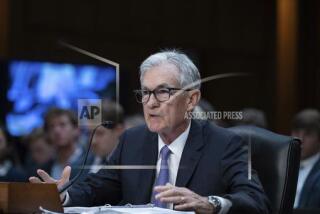Volcker Links Falling Dollar to Inflation : Calls Declines Against Foreign Currencies ‘Two-Edged Sword’
- Share via
WASHINGTON — Federal Reserve Chairman Paul Volcker warned today that recent sharp declines in the dollar, while holding out the potential of helping farmers and manufacturers, also pose a danger of re-igniting inflation.
Volcker said the declines in the foreign exchange value of the dollar, which have been dramatic in recent days, were a “two-edged sword” carrying with them the promise of helping depressed trade sectors but also threatening other dangers.
“Economic history is replete with examples of countries that, in attempting to correct overvaluation of their currencies, failed to take advantage of their improved competitive positions,” Volcker told the House Banking Committee.
“Too often, they lapsed into a debilitating and self-defeating cycle of external depreciation (of their currency) and internal inflation, at the expense of an eroding lose of confidence, higher interest rates and impaired growth,” he said.
Money Targets
Volcker’s comments came as he laid out the central bank’s money targets for 1986, which were set last week at a meeting of the Federal Open Market Committee, the Fed’s policy-making arm.
Volcker said the Fed had made no “significant change” in monetary policy in recent weeks. The comments indicated that the Fed will not be moving to push interest rates lower in coming weeks.
Many private economists had predicted that the Fed would not move toward a looser monetary policy in coming weeks, preferring to wait to see how much the economy rebounds and how successful Congress will be in meeting the budget targets set in the Gramm-Rudman balanced-budget law.
Until recently, many analysts had been predicting that the Volcker-led central bank would do something dramatic, such as cutting its discount rate, to signal its intention to push interest rates lower.
But those hopes faded as the economy showed a surprising pickup in growth without a further nudge from the Fed.
Same Target Range
The central bank said it was setting a target range for growth in the basic measure of the money supply, known as M-1, at 3% to 8% in the coming year--the same target range established for 1985.
M-1, which includes currency in circulation and the value of checking accounts, grew above 12% last year. The target for 1986 and Volcker’s comments indicated that the central bank was willing to live with growth above the target band given the fact that the rate at which money has been changing hands has been sluggish in recent years.
The central bank, in its economic predictions for 1986, said it expected the economy to grow from 3% to 3.5%, as measured from the fourth quarter of 1985 to the fourth quarter of 1986.
This is less optimistic than the Reagan Administration, which is calling for the gross national product to grow 4% in 1986.
More to Read
Inside the business of entertainment
The Wide Shot brings you news, analysis and insights on everything from streaming wars to production — and what it all means for the future.
You may occasionally receive promotional content from the Los Angeles Times.










